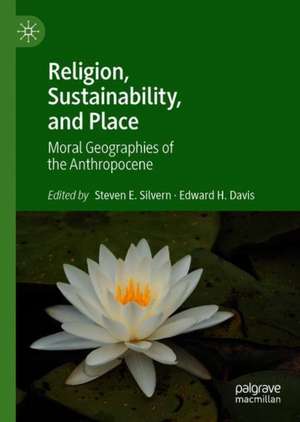Religion, Sustainability, and Place: Moral Geographies of the Anthropocene
Editat de Steven E. Silvern, Edward H. Davisen Limba Engleză Hardback – 15 dec 2020
| Toate formatele și edițiile | Preț | Express |
|---|---|---|
| Paperback (1) | 725.40 lei 6-8 săpt. | |
| Springer Nature Singapore – 16 dec 2021 | 725.40 lei 6-8 săpt. | |
| Hardback (1) | 545.83 lei 3-5 săpt. | +33.38 lei 5-11 zile |
| Springer Nature Singapore – 15 dec 2020 | 545.83 lei 3-5 săpt. | +33.38 lei 5-11 zile |
Preț: 545.83 lei
Nou
Puncte Express: 819
Preț estimativ în valută:
104.54€ • 107.70$ • 87.57£
104.54€ • 107.70$ • 87.57£
Carte disponibilă
Livrare economică 03-17 februarie
Livrare express 18-24 ianuarie pentru 43.37 lei
Preluare comenzi: 021 569.72.76
Specificații
ISBN-13: 9789811576454
ISBN-10: 9811576459
Pagini: 391
Ilustrații: XIX, 391 p. 25 illus., 20 illus. in color.
Dimensiuni: 148 x 210 x 31 mm
Greutate: 0.64 kg
Ediția:1st ed. 2021
Editura: Springer Nature Singapore
Colecția Palgrave Macmillan
Locul publicării:Singapore, Singapore
ISBN-10: 9811576459
Pagini: 391
Ilustrații: XIX, 391 p. 25 illus., 20 illus. in color.
Dimensiuni: 148 x 210 x 31 mm
Greutate: 0.64 kg
Ediția:1st ed. 2021
Editura: Springer Nature Singapore
Colecția Palgrave Macmillan
Locul publicării:Singapore, Singapore
Cuprins
1. Introduction: Religion, Sustainability and Place.- 2. By Their Fruits Ye Shall Know Them: Religion as Practice.- 3. Finding/Revealing/Creating Judaism’s Indigenous Core.- 4. Water Law in Muslim Countries Revisited: A Study of the Qur’anic Sources.- 5. Emerging Places of Repair: A Sustainable Urbanism Approach to Living in and with Cities, Inspired by Vine Deloria, Jr.’s Agent Ontology of Place.- 6. Saving Mount Shasta’s Sacred Water: The Spiritual Campaign against Crystal Geyser.- 7. Land Cover Change in a Ghanaian Sacred Forest.- 8. Role of Faith-based Social Groups in Promoting Sustainable Food Security in Nigeria.- 9. Protecting Ethiopia’s Church Forests: The Disconnect between Western Science and Local Knowledge.- 10. Religion and Spirituality in Hungarian Eco-villages.- 11. Resource Nationalism and Spiritual Pathways to Sustainability in Kyrgyzstan.- 12. Grounded in Community: Christianity and Environmental Engagement in Scotland.- 13. Christian Ideas Influencing U.S. FoodMovements.- 14. The Jewish Food Movement: A Sustainable and Just Vision for Place, Identity and Environment.- 15. A Womanist and Interfaith Response to Climate Change.
Recenzii
“The book is a potentially fabulous teaching resource, especially for courses where religion is a relevant secondary variable. … The thread of chapters that take up food and sustainability … would make for an engaging module on religion, food, and sustainability. Scholars researching or teaching on the religious aspects of sustainability movements will find much on offer in this volume.” (Evan Berry, Journal for the Study of Religion, Nature and Culture, March 2, 2023)
Notă biografică
Steven E. Silvern is Professor of Geography and Sustainability at Salem State University. His research has appeared in journals such as Political Geography, Cultural Geographies, Historical Geography, and American Indian Culture and Research Journal. He is also editor of The Northeastern Geographer.
Edward H. Davis is Professor and Chair in the Department of Geography and Environmental Studies at Emory & Henry College in Virginia, USA. He has published extensively on rural and agricultural change in the US and Central America. Funded by the USDA, his explorations for seed savers in the Southern US led to the collection of dozens of rare heirloom Brassica varieties for the national seed bank. He serves on the board of the Geography of Religions and Belief Systems Specialty Group of the American Association of Geographers.
Textul de pe ultima copertă
“The editors and authors are right to note that the field of sustainability studies has been strangely silent on the salience of religion. This volume provides exactly the right kind of intervention to this emerging and multidisciplinary field, that is one which includes a diverse range of voices, practitioners alongside academics, and focuses on a range of landscapes from Ethiopia to Scotland where religion and sustainability meet in specific problems and forms of praxis. I highly recommend it!”
—Jeremy Kidwell, Department of Theology & Religion, University of BirminghamThis book explores how religious groups work to create sustainable relationships between people, places and environments. This interdisciplinary volume deepens our understanding of this relationship, revealing that the geographical imagination—our sense of place—is a key aspect of the sustainability ideas and practices of religious groups. The book begins with a broad examination of how place shapes faith-based ideas about sustainability, with examples drawn from indigenous Hawaiians and the sacred texts of Judaism and Islam. Empirical case studies from North America, Europe, Central Asia and Africa follow, illustrating how a local, bounded, and sacred sense of place informs religious-based efforts to protect people and natural resources from threatening economic and political forces. Other contributors demonstrate that a cosmopolitan geographical imagination, viewing place as extending from the local to the global, shapes the struggles of Christian, Jewish and interfaith groups to promote just and sustainable food systems and battle the climate crisis.
Caracteristici
Investigates how religious traditions and belief systems are contributing to academic discourse, public policy, and larger public debates over how to create, promote and achieve environmentally and socially sustainable communities Explores the way in which sustainability intersects with religious belief systems, and how different religious belief traditions can contribute to the construction of ethical relationships of people, place and the planet’s ecosystems Offers a diverse array of fascinating case studies from different geographic locales and from diverse religious traditions Provides a platform for scholars, students and the public to re-conceptualize and re-consider how religious belief systems can inform efforts to create moral geographies and sustainable relationships between people, places and environments
